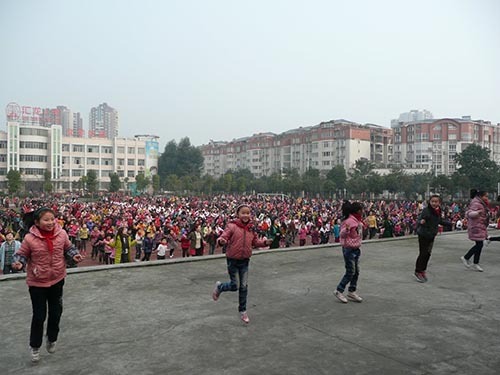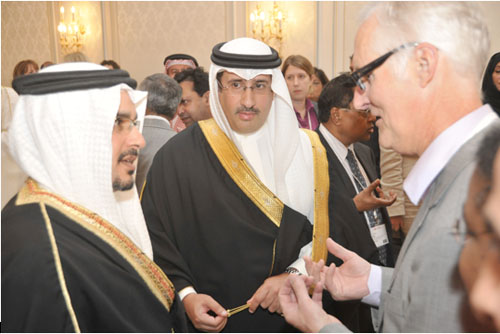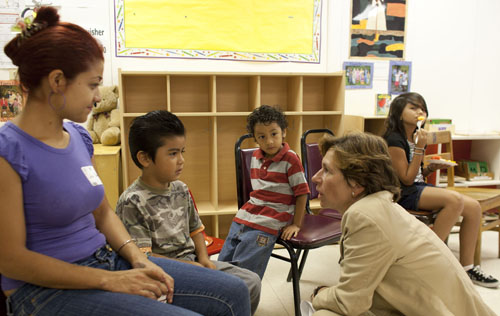
Last Thursday, I attended a dazzling gala to watch special education teacher Matthew Cunningham accept the inaugural GEMS Education Chicago Teacher Award. And yesterday, I listened as Andreas Schleicher presented the key findings from the 2013 OECD تعلیم اور سیکھنے بین الاقوامی سروے (کیا اس طرح کے).
In the context of Education Fast Forward (EFF) Debate 10, “Better Teaching for Better Learning: Results of the OECD Teaching and Learning International Survey (کیا اس طرح کے),” which followed, Lord David Puttnam reminded us all that change is painful. As a young aspiring tennis player with a forehand that needed re-invention, he had learned that lesson the hard way during the 1st round of Junior Wimbledon when it was too late for change.
Change in education has historically taken time, but in an age of innovation when technology is impacting every aspect of our daily lives at a tremendous pace, it is vital to understand the day to day issues faced by teachers globally and move rapidly from a policy standpoint to bring about the changes they need to improve student outcomes.
I asked Michael Fullan, Lord Jim Knight and Pasi Sahlberg to share their perspectives after the Education Fast Forward (EFF) Debate 10.
حضرات, did the TALIS study ask all the right questions?
Pasi Sahlberg: I think overall, TALIS provides important and interesting comparable insights into the teaching profession around the world. Did TALIS ask ALL the right questions? I think this is a question that probably will divide opinions. My own burning question that TALIS doesn’t shed light on is how the rapidly growing Teach for All movement is affecting teachers and their work, especially in countries that are seeing many of their new teachers coming from these fast-track teacher prep programs. Another theme that remains quite silent in this survey is how significant leadership is in making schools work well. TALIS focused primarily on teachers and much less so on school leaders.
مائیکل Fullan: The TALIS study is valuable to generate a strong debate on the current status of teaching. It fell short because it generated what I call ‘Dangerous Half Truths’ – findings that have some merit but are deficient because they can be easily misinterpreted and result in superficial or harmful policies. مثال کے طور پر, the finding that teacher appraisal/feedback can lead to positive change in classroom practice fails to specify under what conditions this would be true (true if there is a collaborative and growth oriented culture; false if there is a punitive carrot and stick culture). The same problem affects the other big factor examined, Professional Development, which again only is effective when it contains strong pedagogical content and is integrated into the school improvement plans of school leaders and teachers working together.
رب جم نائٹ: موٹے طور پر بول رہا ہوں, جی ہاں, the study did ask all the right questions. It is always possible to quibble but it remains very insightful for secondary schools. I would have loved to see elementary school data to make a comparison.
What was the most important take home for you?
Pasi Sahlberg: I think the most interesting take-away for me is teachers’ views of the way society values the teaching profession and how wide the gap is between the countries where teachers feel they are valued and where they feel they are not. It is alarming to me that in France, Sweden and Spain, less than one of ten teachers feels valued. This suggests that it is not just more professional development or more pay that will change this dangerous trend, but more fundamental change in the role of how teachers are treated is needed.
مائیکل Fullan: The most important take away was the consistency of findings throughout the report that showed that teacher efficacy and job satisfaction were strongest when teachers work together, and principals work as instructional leaders helping teachers work in collaborative focused ways on the student learning agenda. بدقسمتی سے, these findings tend to be underplayed because of the focus on appraisal and professional development. Not enough was made of the more powerful conclusion that improvement happens more deeply and more quickly when school leaders and teachers work together in focused ways on improving learning and achievement.
رب جم نائٹ: The most important take away is the importance of collaboration and feedback to drive development.
What are the key things we need to do to improve the teaching profession?
Pasi Sahlberg: If teachers are to engage in professional development, collaborative school improvement and pedagogical reflection in their work, as TALIS shows successful education systems do, changes in teachers’ working conditions must take place. بعض ممالک میں, اساتذہ’ work loads before professional development and collaboration in school are so big that, in most cases, they don’t have time and energy to do anything else. One thing that should improve is better teacher policies in national education strategies. This includes as much how teachers are prepared as how they should be helped and supported in their work. We should stop thinking that teaching is easy and therefore anyone can be a teacher. Instead we should think that teaching is not rocket science, it much more complicated than that.
مائیکل Fullan: We need to stop counting so heavily on teacher appraisal based on carrots and sticks, and instead build the profession through i) focused intra-school collaboration; دوم) focused inter-school learning; III) standards for students, ترقیاتی نکالا جاتا ہے کو اساتذہ اور اسکول کے رہنماؤں; چہارم) پریکٹس اور نتائج کی شفافیت; اور V) عام طور پر تمام اساتذہ کو متاثر کرنے والے ترقی پذیر حل پیش کرنے میں پیشے کو شامل. پٹا s رپورٹ بیرونی ضروریات کے سلسلے میں گروپ کے ذریعے کارفرما احتساب پر منفی احتساب سے آگے بڑھ کے اہم مشکوک ارد گرد skirted.
رب جم نائٹ: ہم وہ ایک الزمی طریقہ کے مقابلے میں ایک اختراعی انداز میں تعاون استعمال کرتے ہیں تاکہ اساتذہ کی حوصلہ افزائی کرنے کی ضرورت ہے. Teachers should have the right to more time for professional development.
More about EFF Debate 10 including Andreas Schleicher’s presentation.
Michael Fullan is the author of many books on education and a co-author of پروفیشنل کیپٹل: ہر اسکول میں درس و تدریس کو تبدیل کرنا. Lord Jim Knight is Managing Director of TSL Education, the largest network of teachers in the world. Pasi Sahlberg is the author of فننش اسباق: عالمی فن لینڈ میں تعلیمی تبدیلی سے کیا سیکھ سکتے ہیں?


Photo of sky scene is courtesy of GEMS Education
تعلیم کے لئے عالمی تلاش میں, سر مائیکل باربر سمیت میرے ساتھ اور عالمی سطح پر معروف فکری رہنماؤں (برطانیہ), ڈاکٹر. مائیکل بلاک (امریکہ), ڈاکٹر. لیون Botstein (امریکہ), پروفیسر مٹی Christensen کے (امریکہ), ڈاکٹر. لنڈا ڈارلنگ-ہیمنڈ (امریکہ), ڈاکٹر. مادھو چوہان (بھارت), پروفیسر مائیکل Fullan (کینیڈا), پروفیسر ہاورڈ گارڈنر (امریکہ), پروفیسر اینڈی Hargreaves نے (امریکہ), پروفیسر کریں Yvonne ہلمین (نیدرلینڈ), پروفیسر کرسٹن Helstad (ناروے), جین Hendrickson نے (امریکہ), پروفیسر گلاب Hipkins (نیوزی لینڈ), پروفیسر Cornelia Hoogland (کینیڈا), فاضل جیف جانسن (کینیڈا), مسز. چینٹل کوفمین (بیلجیم), ڈاکٹر. Eija Kauppinen (فن لینڈ), سٹیٹ سیکرٹری Tapio Kosunen (فن لینڈ), پروفیسر ڈومینک Lafontaine (بیلجیم), پروفیسر ہیو Lauder (برطانیہ), پروفیسر بین لیون (کینیڈا), رب کین میکڈونلڈ (برطانیہ), پروفیسر بیری McGaw (آسٹریلیا), شیو ندار (بھارت), پروفیسر R. نٹراجن (بھارت), ڈاکٹر. PAK NG (سنگاپور), ڈاکٹر. ڈینس پوپ (امریکہ), شریدر رازگوپالن (بھارت), ڈاکٹر. ڈیانے Ravitch (امریکہ), رچرڈ ولسن ریلی (امریکہ), سر کین رابنسن (برطانیہ), پروفیسر Pasi Sahlberg (فن لینڈ), پروفیسر Manabu ساتو (جاپان), Andreas کی Schleicher (پیسا, او ای سی ڈی), ڈاکٹر. انتھونی Seldon نے (برطانیہ), ڈاکٹر. ڈیوڈ Shaffer کے (امریکہ), ڈاکٹر. کرسٹن عمیق کر رہے ہیں (ناروے), چانسلر اسٹیفن Spahn (امریکہ), ایوز Theze (اسکول Français کی امریکہ), پروفیسر چارلس Ungerleider (کینیڈا), پروفیسر ٹونی ویگنر (امریکہ), سر ڈیوڈ واٹسن (برطانیہ), پروفیسر Dylan کے Wiliam (برطانیہ), ڈاکٹر. مارک Wormald (برطانیہ), پروفیسر تیو Wubbels (نیدرلینڈ), پروفیسر مائیکل نوجوان (برطانیہ), اور پروفیسر Minxuan جانگ (چین) وہ تمام اقوام کو آج سامنا ہے کہ بڑی تصویر تعلیم سوالات دریافت کے طور پر.
تعلیم کمیونٹی پیج کے لئے گلوبل تلاش
C. M. روبن وہ ایک موصول ہوئی ہے جس کے لئے دو بڑے پیمانے پر پڑھا سیریز کے مصنف ہے 2011 میں Upton سنکلیئر ایوارڈ, “تعلیم کے لئے گلوبل تلاش” اور “کس طرح پڑھیں گے?” انہوں نے تین bestselling کتابوں کے مصنف ہیں, سمیت Wonderland میں یلس اصلی, کے ناشر ہے CMRubinWorld, اور ایک Disruptor فاؤنڈیشن فیلو.
C پر عمل کریں. M. ٹویٹر پر روبن: www.twitter.com/@cmrubinworld






حالیہ تبصرے